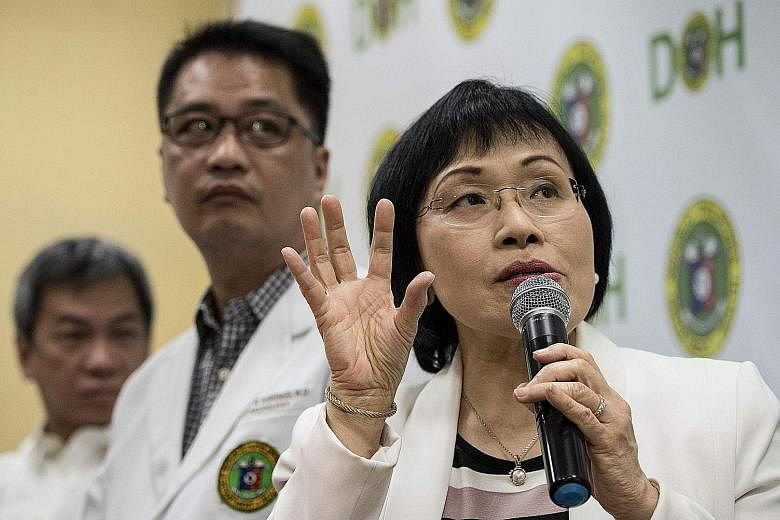MANILA • Widespread fears over a controversial dengue vaccine that some blame for child deaths are wreaking havoc on the Philippines' war on preventable diseases, with many parents refusing to have their children immunised, a senior health official said yesterday.
Immunisation rates for polio, chicken pox, tetanus and other diseases are significantly down from previous years since the government suspended the sale and distribution of the Dengvaxia vaccine in December, Health Undersecretary Rolando Enrique Domingo said.
The government is also investigating Dengvaxia's alleged role in the deaths of at least 14 children who were among the 830,000 who got the vaccine as part of the world's first public dengue immunisation programme in 2016 to 2017.
"Our programmes are suffering... (Filipinos) are scared of all vaccines now," Dr Domingo said, adding that immunisation rates for some diseases are down to 60 per cent, significantly lower than in recent years and below the target of 85 per cent.
The Philippine government is concerned about the potential for epidemics because of lower immunisation rates, he said.
Dengue - a mosquito-borne disease - infects 400 million people each year and kills 9,000 globally, the Health Department said, citing World Health Organisation data. The Philippines has one of the highest dengue fatality rates in the world, with 732 deaths last year.
Dengvaxia's manufacturer Sanofi disclosed last November that the drug could worsen symptoms for people who had not previously been infected with the virus. This sparked nationwide panic, with some parents alleging the vaccine caused the deaths of their children.
"When you go to the communities, all the paediatricians are really heartbroken because all the patients - the parents (and) the children - feel that they are going to die," Dr Domingo said.
Sanofi says no one has been proven to have died from the vaccine, but last month the French pharmaceutical giant agreed to reimburse the Philippine government for leftover doses.
The Health Department said in a statement yesterday that initial results of the inquiry into the deaths of the 14 children injected with Dengvaxia found no direct proof it had caused any of the fatalities.
"(Three children) died from dengue even though they were given Dengvaxia - vaccine failure was the possible cause in two of them," the department said.
Asked if the vaccine itself caused the three deaths, Dr Juliet Sio-Aguilar, the head of the inquiry, told reporters that while it could be possible, "we cannot categorically say". Further studies on tissue samples are needed, she added.
Nine of the children were found to have died of causes unrelated to dengue, while the cause of two other deaths could not be determined. Dr Domingo said they would need three to five more years to see if there would be other adverse reactions from the vaccine.
The Health Ministry will share the panel's findings with the Justice Department, which is considering cases against those responsible for the dengue immunisation programme.
AGENCE FRANCE-PRESSE, REUTERS

